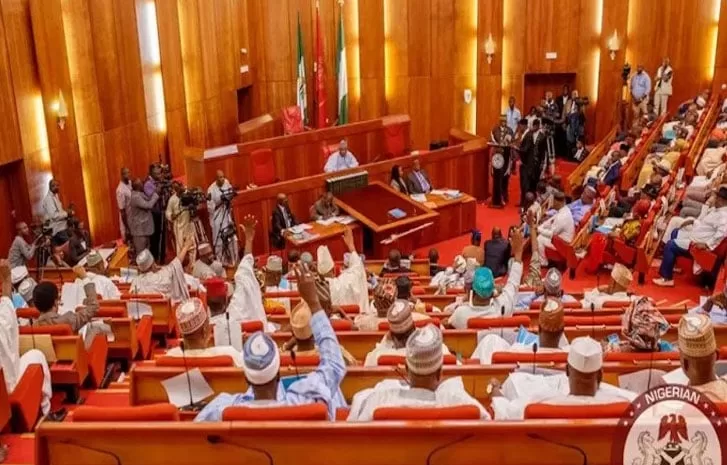
AKPABIO, LAWAN RISK LOSING SEATS AS SENATE WEIGHS ROTATIONAL GOVT
A major shake-up is looming in the National Assembly as the Senate considers far-reaching amendments to the 1999 Constitution, including a bill that mandates the rotational representation of political offices across constituencies, senatorial zones, and geopolitical regions.
If passed, the proposed legislation could mark the end of the road for several long-serving lawmakers, widely regarded as the ‘landlords’ of the National Assembly.
Among the proposed amendments is a clause altering Section 48 of the constitution to ensure senatorial seats rotate among federal constituencies within a senatorial district.
The bill states that “every Federal Constituency in a Senatorial District which has produced a Senator shall not be eligible to produce a Senator, unless and until all other Federal Constituencies produce a Senator.”
This proposal targets the perceived monopolisation of elective offices by a few constituencies and individuals, some of whom have held legislative positions for over two decades.
For instance, Godswill Akpabio is a serving senator for a second term, having occupied several executive offices.
Also, Ahmad Lawan, immediate past president of the Senate, has been in the National Assembly since 1999.
He began his journey in the House of Representatives, serving two terms before moving to the Senate, where he has remained since 2007.
Similarly, Alhassan Ado-Doguwa, a key figure in the House of Representatives, was first elected during the botched Third Republic and returned to the House in 2007 to represent Doguwa/Tudun Wada federal constituency in Kano State.
Another ‘landlord,’ Mohammed Tahir Monguno, currently represents Borno North Senatorial District in the 10th Assembly.
Monguno, the current whip of the Senate, has served multiple terms in the House since the early 1990s, before moving to the Senate.
Others in this long-serving category include Enyinnaya Abaribe, representing Abia South Senatorial District since 2007; Khadijat Bukar Abba-Ibrahim, who has represented Damaturu/Gujba/Gulani/Tarmuwa Federal Constituency in Yobe since 2007, with a stint as Minister of State for Foreign Affairs.
Also, on the list is Mukhtar Betara, chairman of the powerful House Committee on Appropriations, representing Biu/Bayo/Shani Federal Constituency in Borno; Nicholas Mutu, the longest-serving member from the South-South in the House since 1999 and former chairman of the Niger Delta Development Commission (NDDC) Committee.
The rest are: Adamu Aliero, Seriake Dickson, Orji Uzor Kalu, Abdullahi Yahaya, Jarigbe Jarigbe, Abba Moro, Abdul Ningi, and Ali Ndume, among others.
The Senate is also considering a rotational clause in Section 133, which seeks to institutionalise rotational presidency among Nigeria’s six geopolitical zones.
The clause states, “The office of the President of Nigeria shall revolve around the six Geo-political Zones…
“Any zone which has produced a President shall not be eligible to produce another until the other Zones take their turns.”
This change would likely disqualify regions that have already held the presidency since 1999, including the South-West, South-South, and North-West, from fielding presidential candidates again until other zones take their turns.
It also specifies May 29, 1999, as the start date for calculating eligibility.
In a similar move, the Senate is considering an amendment to Section 179, which mandates the rotation of governorship across the three senatorial zones in each state, effectively ending decades-long dominance by specific regions within a state.
Also on the table is a proposed amendment to Section 49, ensuring that House of Representatives seats rotate among local governments within a federal constituency, further expanding the scope of political inclusion and reducing the entrenchment of power in the hands of a few.
Supporters of the bill argue that it will strengthen democracy, promote equity, and prevent political stagnation.
Experts weigh in
Speaking on the bill, Doris Bawa, a constitutional lawyer, said, “These amendments aim to engineer social progress, deepen inclusion, and ensure that all parts of the country feel represented.
“This could be a defining moment for the legislature. If the Senate succeeds in passing these amendments, it would be one of the boldest institutional reforms in recent Nigerian history, one that forces power to circulate and not concentrate.”
However, Ayoola Samuel, a political analyst, noted that such a bill will greatly impact institutional memory.
He said, “There is something to be said for continuity. In a developing democracy like ours, we need seasoned lawmakers who understand not just the rules but the political culture, stakeholder relationships, and historical context of national issues.
“You can’t replace that with new faces every four years.”
He noted that institutional memory plays a critical role in legislative success.
He added, “Experienced lawmakers often serve as mentors to younger colleagues, steer complex debates, and help to avert costly mistakes rooted in ignorance of past legislative decisions.
“Mandatory rotation could flood the chambers with political greenhorns, slow down decision-making, and erode the institutional capacity that Nigeria’s legislature has spent decades building.
 Premium News
Premium News